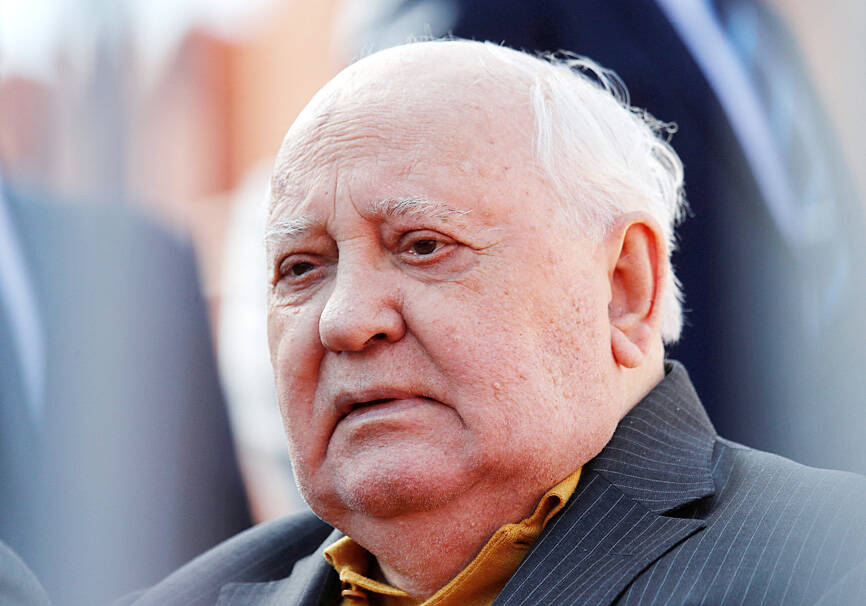Before Mikhail Gorbachev came along, the Soviet Union seemed an immovable superpower in perpetual antagonism to the US, but with a breathtaking series of reforms, he changed all that as president, redirecting the course of the 20th century.
Alongside former US president Ronald Reagan and former British prime minister Margaret Thatcher, Gorbachev was a key protagonist in a global drama that many thought impossible and, for those who lived through it, seemed almost surreal.
Under Gorbachev, the Berlin Wall crumbled, thousands of political prisoners were released and millions of people who had known only communism got their first glimpse of freedom.

Photo: Reuters
However, he was unable to control the forces he unleashed and ultimately waged a losing battle to salvage a crumbling empire.
Gorbachev died on Tuesday at a Moscow hospital.
He was 91.
Although little known outside Sovietologist circles before he became leader in 1985, he quickly became a dominant and charismatic figure on the world stage. The splotchy purple birthmark on his bald pate made him instantly recognizable, and his vigor stood in sharp contrast to a run of aged and barely articulate Kremlin leaders.
His vision of remaking the Soviet Union into a more humane and flexible country had the power of the epochal.
By 1990, he had won the Nobel Prize for his “leading role” in ending the Cold War and reducing nuclear tensions.
However, a year later, he was the sad and bewildered embodiment of failure. The country had fallen apart in his hands, and at home he was derided, despised and increasingly shunted aside as irrelevant.
His power hopelessly sapped by an attempted coup against him in August 1991, Gorbachev spent his last months in office watching republic after republic declare independence until he resigned on Dec. 25, 1991, and the Soviet Union wrote itself into oblivion a day later.
Many of the changes, including the Soviet breakup, bore no resemblance to the transformation that Gorbachev had envisioned when he became Soviet leader in March 1985.
By the end of his rule, he was powerless to halt the whirlwind he had sown. Yet Gorbachev might have had a greater impact on the second half of the 20th century than any other political figure.
“I see myself as a man who started the reforms that were necessary for the country and for Europe and the world,” Gorbachev told reporters in a 1992 interview shortly after he left office. “I am often asked, would I have started it all again if I had to repeat it? Yes, indeed. And with more persistence and determination.”

CLASH OF WORDS: While China’s foreign minister insisted the US play a constructive role with China, Rubio stressed Washington’s commitment to its allies in the region The Ministry of Foreign Affairs (MOFA) yesterday affirmed and welcomed US Secretary of State Marco Rubio statements expressing the US’ “serious concern over China’s coercive actions against Taiwan” and aggressive behavior in the South China Sea, in a telephone call with his Chinese counterpart. The ministry in a news release yesterday also said that the Chinese Ministry of Foreign Affairs had stated many fallacies about Taiwan in the call. “We solemnly emphasize again that our country and the People’s Republic of China are not subordinate to each other, and it has been an objective fact for a long time, as well as

‘CHARM OFFENSIVE’: Beijing has been sending senior Chinese officials to Okinawa as part of efforts to influence public opinion against the US, the ‘Telegraph’ reported Beijing is believed to be sowing divisions in Japan’s Okinawa Prefecture to better facilitate an invasion of Taiwan, British newspaper the Telegraph reported on Saturday. Less than 750km from Taiwan, Okinawa hosts nearly 30,000 US troops who would likely “play a pivotal role should Beijing order the invasion of Taiwan,” it wrote. To prevent US intervention in an invasion, China is carrying out a “silent invasion” of Okinawa by stoking the flames of discontent among locals toward the US presence in the prefecture, it said. Beijing is also allegedly funding separatists in the region, including Chosuke Yara, the head of the Ryukyu Independence

UNITED: The premier said Trump’s tariff comments provided a great opportunity for the private and public sectors to come together to maintain the nation’s chip advantage The government is considering ways to assist the nation’s semiconductor industry or hosting collaborative projects with the private sector after US President Donald Trump threatened to impose a 100 percent tariff on chips exported to the US, Premier Cho Jung-tai (卓榮泰) said yesterday. Trump on Monday told Republican members of the US Congress about plans to impose sweeping tariffs on semiconductors, steel, aluminum, copper and pharmaceuticals “in the very near future.” “It’s time for the United States to return to the system that made us richer and more powerful than ever before,” Trump said at the Republican Issues Conference in Miami, Florida. “They

GOLDEN OPPORTUNITY: Taiwan must capitalize on the shock waves DeepSeek has sent through US markets to show it is a tech partner of Washington, a researcher said China’s reported breakthrough in artificial intelligence (AI) would prompt the US to seek a stronger alliance with Taiwan and Japan to secure its technological superiority, a Taiwanese researcher said yesterday. The launch of low-cost AI model DeepSeek (深度求索) on Monday sent US tech stocks tumbling, with chipmaker Nvidia Corp losing 16 percent of its value and the NASDAQ falling 612.46 points, or 3.07 percent, to close at 19,341.84 points. On the same day, the Philadelphia Stock Exchange Semiconductor Sector index dropped 488.7 points, or 9.15 percent, to close at 4,853.24 points. The launch of the Chinese chatbot proves that a competitor can